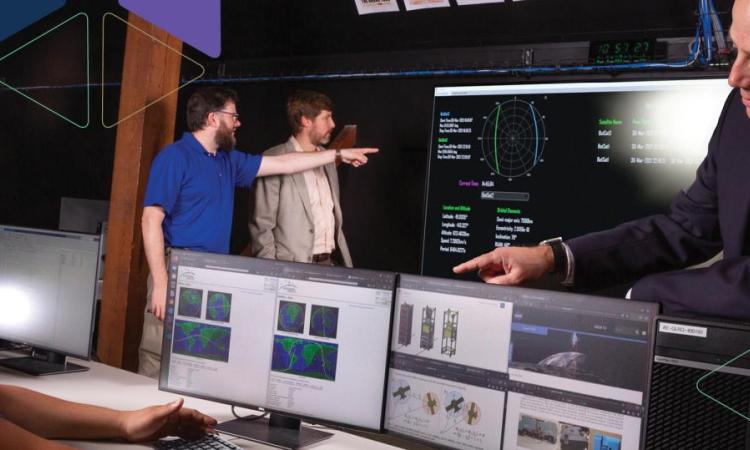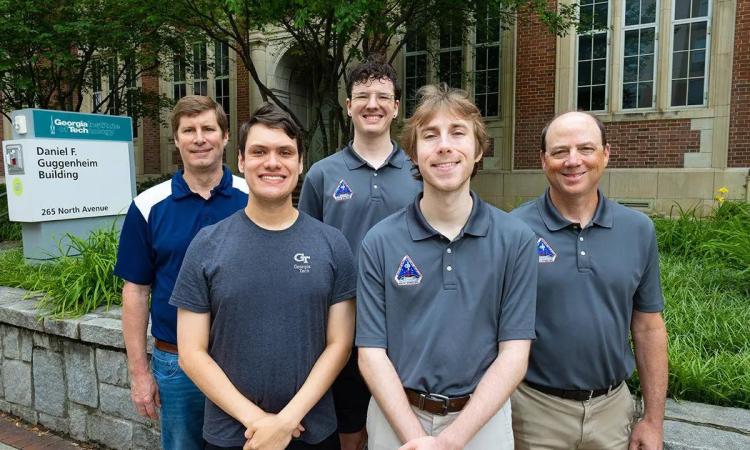AE recognizes faculty for outstanding accomplishments in space exploration.
The Daniel Guggenheim School of Aerospace Engineering (AE) has named Professor Glenn Lightsey the John W. Young Endowed Chair for his expertise in space systems technology. Dr. Lightsey currently serves as the chair of Georgia Tech’s Space Research Initiative steering committee. Until last year, he was the director of the Space Systems Design Lab (SSDL) and the Center for Space Technology and Research, focusing on innovation and student success.
“I am incredibly grateful to be selected as the John Young Chair Professor. In addition to being an outstanding leader and Georgia Tech alumnus, John’s life is an amazing example of what is possible. It is inspiring to hold the position that bears his name," Lightsey shared.
In 2021, AE announced the John W. Young Endowed Chair position in honor of the late astronaut who graduated from AE in 1952. Young flew for NASA’s Gemini, Apollo, and Space Shuttle programs and was the most experienced astronaut in history. Lightsey is the second person to receive this prestigious honor.
“We are delighted to honor Professor Glenn Lightsey with this prestigious distinction. His passion for space-related research and his commitment to student development are well-aligned with the John Young Chair,” said AE Chair Mitchell Walker, the inaugural recipient of the honor in 2022.
Lightsey’s research on space systems technology, including small satellites, space exploration, propulsion, satellite operations, and space systems engineering, has elevated him to a national stage. He has been a driving force in the miniaturization of spacecraft, a movement that has revolutionized the industry by providing greater access to space.
His contributions to the field of space technology span over two decades. He joined the faculty at Georgia Tech in 2015, coming from The University of Texas at Austin. He has authored over 180 technical articles and publications, and his role as the associate editor-in-chief of the Journal of Small Satellites underscores his influence in the academic community. As an American Institute of Aeronautics and Astronautics (AIAA) Fellow and a founding member of the AIAA Small Satellite Technical Committee, he stays on the cutting edge of space technology.
Starting 2018, Lightsey and his team developed the propulsion system for the small satellite BioSentinel that was launched aboard NASA’s Artemis I mission in 2022. The 3U CubeSat carried two strains of yeast to understand the impact of deep space radiation on living organisms.
The AE professor also served as Georgia Tech’s co-principal investigator for NASA’s Lunar Flashlight project. Lightsey and his team of students developed the propulsion system for the Lunar Flashlight CubeSat and operated the satellite in interplanetary space, which became the first-ever interplanetary spacecraft operated by students.
Another flight project Lightsey’s team contributed to is a NASA mission called Sun Radio Interferometer Space Experiment (SunRISE) that will observe the solar environment to develop 3D maps. Lightsey’s team built six additively manufactured cold gas propulsion systems for a group of small satellites, which will launch into a near-geosynchronous orbit later this year.
Current Projects
Lightsey and his team are currently in the design phase for NASA’s Green Propulsion Dual Mode (GPDM) project. GPDM is a future technology demonstration mission led by NASA’s Marshall Space Flight Center that will fly a satellite using a single liquid propellant to fuel high-thrust chemical monopropellant and high-efficiency electrospray thrusters.
Lightsey’s research group is also participating in a multi-university CubeSat formation flying mission that aims to image the sun in high resolution and reveal energy-release sites in the solar corona. The project, VISORS: Virtual Super-Resolution Optics Using Reconfigurable Swarms, is sponsored by the National Science Foundation.
Related Stories:

Georgia Tech to Strengthen Nation’s Faculty Development in Geospace Science
Georgia Tech’s Colleges of Engineering and Sciences have been chosen by the National Science Foundation (NSF) to hire a new faculty member focused on solar-terrestrial science and space weather research.

New Multidisciplinary Initiative Marks Golden Age for Space Research
Plans are underway for the next big phase of Georgia Tech’s outer space mission with the launch of the Space Research Initiative (SRI) on campus.

Students Controlling Interplanetary Spacecraft Nearly 3.7 Million Miles From Campus
Instead of owning Lunar Flashlight, the students planned to control it, on behalf of JPL, around the moon this year in a search for signs of frozen water on the lunar surface.
(text and background only visible when logged in)
